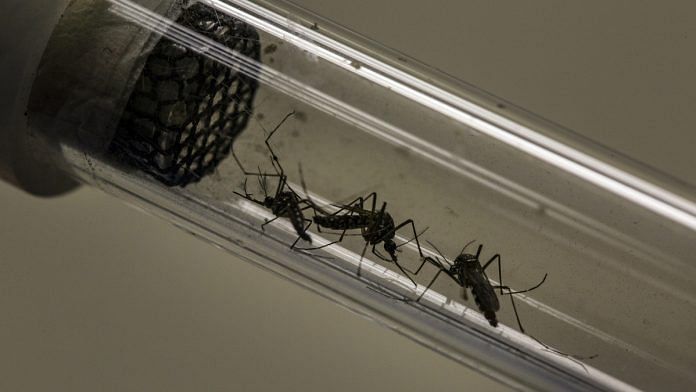Singapore: Getting people to hunker down at home has helped stem the coronavirus pandemic, but in parts of Southeast Asia, it’s spurred another potentially deadly disease: dengue.
The mosquito-borne viral illness, sometimes known as break-bone fever because of the joint-pain it inflicts, has skyrocketed in the tropical region just as the usual dengue-spreading season begins. Singapore reported an average of 165 cases a day in the week through June 13, a record which authorities said may herald the largest dengue outbreak in the city-state’s history.
Dengue is transmitted by the bite of a female Aedes mosquito. The insect species is widespread in Southeast Asia and thrives in sources of stagnant water in and around dwellings. People have spent more time in their homes to reduce transmission of Covid-19, and a World Health Organization spokesperson said the movement restrictions may be preventing communities and households from cleaning up potential mosquito-breeding sites in the neighborhood.
“Lockdowns are placing more people at home than they normally would,” said Cameron Simmons, director of the Institute of Vector-Borne Disease at Melbourne’s Monash University, who studied dengue in Vietnam. “While no evidence has emerged proving a direct link, lockdowns could potentially have created an environment where mosquitoes are interacting more with the population than they would otherwise.”
Movement curbs probably worsened the dengue outbreak, said Siti Nadia Tarmizi, the director for vector-borne and zoonotic disease at Indonesia’s health ministry. As of Wednesday, the country has recorded some 64,251 dengue cases in 2020, almost 60% more than at the same time last year. Bali, the popular tourist destination, has almost 9,000 infections.
Also read:Why it’s still hard to predict who will die from Covid-19
Wet Season
In neighboring Malaysia, weekly cases have climbed to 1,927, according to the Ministry of Health, which expects the current wave to last until September. A longer than expected rainy season in the region is contributing to the increase in cases.
Singapore had 211 active dengue clusters as of June 15 and at least 11,166 people are known to have caught the virus from Jan. 1 to June 15, according to data from the National Environment Agency. Infections may match or top the 22,170 cases reported in 2013, the largest dengue outbreak in the city-state’s history.
The disease, which can cause a spectrum of illness including fatal shock, is caused by one of four virus types. The less-common type 3, or DenV-3, has driven the outbreak — the first time it’s been the dominant strain in Singapore in almost three decades. Low protective immunity to DenV-3 in the community has enabled it to flourish, the environment agency said.
The traditional dengue peak season could last a few months, from June to October, “thus immediate action must be taken to break disease transmission,” it said this week.
The challenge is to mobilize the population to do more to combat the spread of dengue and increase surveillance, said Ooi Eng Eong, deputy director for the program in emerging infectious diseases at Singapore’s Duke-NUS Medical School.
Such efforts have paid off in Thailand and the Philippines, where cases have declined this year. Dengue has been endemic in these countries as well as in Indonesia for many decades, so most people above the age of 30-40 years have some immunity, according to Monash University’s Simmons. Singapore, however, has lower herd immunity compared to these other places, which has caused more transmissions, he said.
Any dengue outbreak in the region should still be treated as a major health concern, said Singapore’s Ooi.
“Covid-19 has shown us that infectious diseases do not respect borders, and how reliant economies are on the global supply chain, much of which originates in the tropics,” he said.- Bloomberg
Also read:Dengue, H1N1, leptospirosis — the monsoon challenges Kerala faces besides coronavirus



